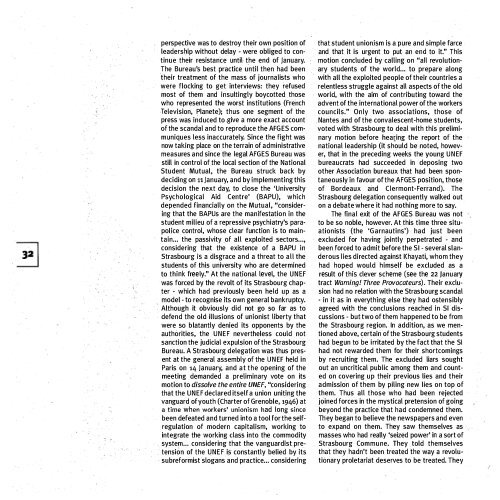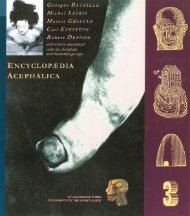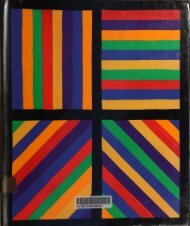SITUATIONISTS AND THE 1£CH MAY 1968
umMYFs
umMYFs
Create successful ePaper yourself
Turn your PDF publications into a flip-book with our unique Google optimized e-Paper software.
perspective was to destroy their own position of<br />
leadership without delay - were obliged to continue<br />
their resistance until the end of January.<br />
The Bureau's best practice u·ntil then had been<br />
their treatment of the mass of journalists who<br />
were flocking to get interviews: they refused<br />
most of them and insultingly boycotted those<br />
who represented the worst institutions (French<br />
Television, Planete); thus one segment of the<br />
press was induced to . give a more exact account<br />
of the scandal and to reproduce the AFG ES communiques<br />
less inaccurately. Since the fight was<br />
now taking place on the terrain of administrative<br />
measures and since the legal AFGES Bureau was<br />
still in control of the local section of the National<br />
Student Mutual, the Bureau struck back by<br />
deciding on 11 January, and by implementing this<br />
decision the next day, to close the 'University<br />
Psychological Aid Centre' (BAPU), which<br />
depended financially on the Mutual, "considering<br />
that the BAPUs are the manifestation in the<br />
student milieu of a repressive psychiatry's parapolice<br />
control, whose clear function is to maintain<br />
... the passivity of all exploited sectors ...,<br />
considering that the existence of a BAPU in<br />
Strasbourg is a disgrace and a threat to all the<br />
students of this university who are determined<br />
to think freely." At the national level, the UNEF<br />
was forced by the revolt of its Strasbourg chapter<br />
- which had previously been held up as a<br />
model - to recognise its own general bankruptcy.<br />
· Although it obviously did not go so far as to<br />
defend the old illusions of unionist liberty that<br />
were so blatantly denied its opponents by the<br />
authorities, the UNEF nevertheless could not<br />
sanction the judicial expulsion of the Strasbourg<br />
Bureau. A Strasbourg delegation was thus present<br />
at the general assembly of the UNEF held in<br />
Paris on 14 January, and at the opening of the<br />
meeting demanded a preliminary vote on its<br />
motion to dissolve the entire UNEF, "considering<br />
that the UNEF declared itself a union uniting the<br />
vanguard of youth (Charter of Grenoble, 1946) at<br />
a time when workers' unionism had long since<br />
been defeated and turned into a tool for the selfregulation<br />
of modern capitalism, working to<br />
integrate the working class into the commodity<br />
system ... considering that the vanguardist.pretension<br />
of the UNEF is constantly belied by its<br />
subreformist slogans and practice ... considering<br />
that student unionism is a pure and simple farce<br />
and that it is urgent to put an end to it." This<br />
motion concluded by calling on "all revolutionary<br />
students of the world ... to prepare along<br />
with all the exploited people of their countries a<br />
relentless struggle against all aspects of the old<br />
world, with the aim of contributing toward the<br />
advent of the .international power of the workers<br />
councils." Only two associations, those of<br />
Nantes and of the convalescent-home students,<br />
voted with Strasbourg to deal with this preliminary<br />
motion before hearing the report of the<br />
national leadership (it should be noted, however,<br />
that in the preceding weeks the young UNEF<br />
bureaucrats had succeeded in deposing two<br />
other Association bureaux that had been spontaneously<br />
in favour of the AFGES position, those<br />
of Bordeaux and Clermont-Ferrand). The<br />
Strasbourg delegation consequently walked out<br />
on a debate where it had nothing more to say.<br />
The final exit of the AFGES Bureau was not<br />
to be so noble, however. At this time three situationists<br />
(the 'Garnautins') had just been<br />
excluded for having jointly perpetrated - and<br />
been forced to admit before the SI - several slanderous<br />
lies directed against Khayati, whom they<br />
had hoped would himself be excluded as a<br />
result of this clever scheme (see the 22 January<br />
tract Warning! Three Provocateurs). Their exclusion<br />
had no relation with the Strasbourg scandal<br />
- in it as in everything else they had ostensibly<br />
agreed with the conclusions reached in SI discussions<br />
- but two of them happened to be from<br />
the Strasbourg region. In addition, as we mentioned<br />
above, certain of the Strasbourg students<br />
had begun to be irritated by the fact that the SI<br />
had not rewarded them for their shortcomings<br />
by recruiting them. The excluded liars sought<br />
out an uncritical public among them and counted<br />
on covering up their previous lies and their<br />
admission of them by piling new lies on top of<br />
them. Thus all those who had been rejected<br />
joined forces in the mystical pretension of going<br />
beyond the practice that had condemned them.<br />
They began to believe the newspapers and even<br />
to expand on them. They saw themselves as<br />
masses who had really 'seized power' in a sort of<br />
Strasbourg Commune. They told themselves<br />
that they hadn't been treated the way a revolutionary<br />
proletariat deserves to be treated. They










